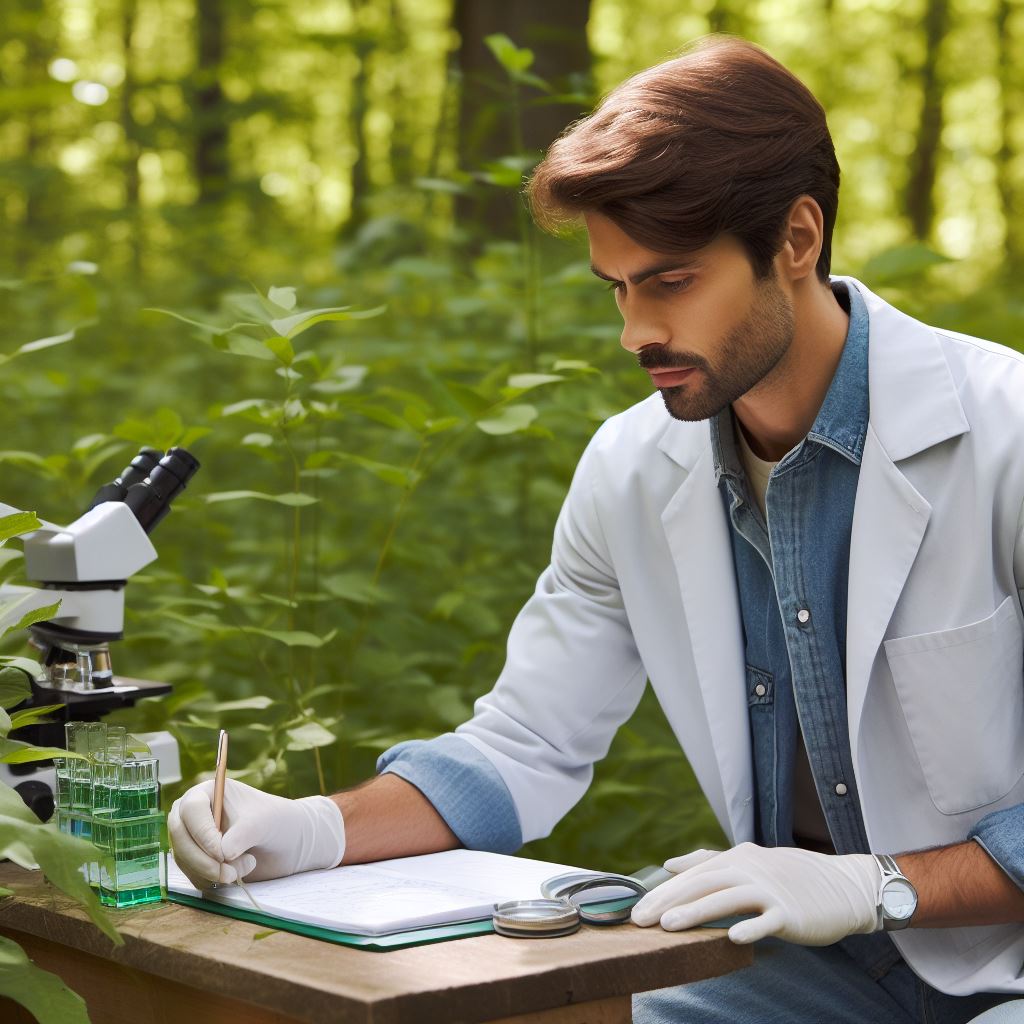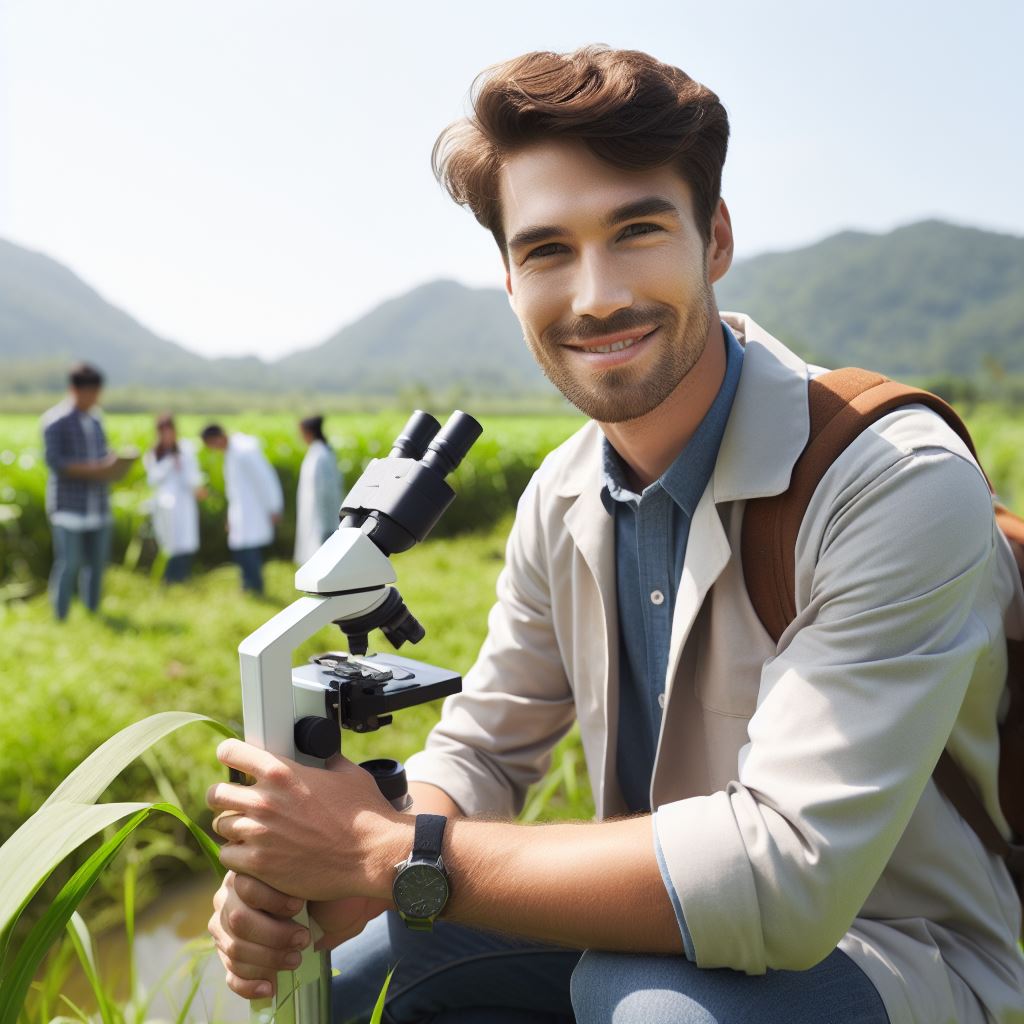Introduction
A. Pioneers of environmental science in the United States
Pioneers of environmental science in the United States have made significant contributions to the field, shaping environmental policies and activism.
Their work has been instrumental in raising awareness about the importance of protecting the environment.
B. The importance of their contributions to the field and their influence on environmental policies and activism
These pioneers have conducted groundbreaking research, developed innovative technologies, and advocated for sustainable practices.
Their contributions have paved the way for a better understanding of the environment and the impacts of human activities.
Also Their influential work has not only led to the establishment of environmental regulations but also sparked a global movement towards conservation and sustainability.
Their findings have prompted governments, organizations, and individuals to take action and prioritize environmental protection.
These pioneers of environmental science have also played a crucial role in raising public awareness about environmental issues.
By educating the public through publications, lectures, and campaigns, they have inspired countless individuals to become proactive in preserving the environment.
Furthermore, these pioneers have successfully influenced environmental policies by participating in government agencies, advisory boards, and international organizations.
Their expertise and research have guided policy decisions and shaped regulations that aim to protect the environment and promote sustainable practices.
Basically, the pioneers of environmental science in the United States have made indispensable contributions to the field.
Their research, activism, and influence have had a profound impact on environmental policies and raised awareness about the crucial need for environmental protection.
Their work continues to inspire future generations to work towards a sustainable and environmentally conscious future.
Early Pioneers of Environmental Science in the U.S.
A. John Muir: Guardian of the Wilderness
John Muir, a Scottish-born American, was a driving force in the early environmental conservation movement in the U.S.
He founded the Sierra Club in 1892, which remains a prominent environmental organization today.
Muir’s advocacy played a pivotal role in preserving Yosemite National Park, a natural wonderland.
His writings, like “My First Summer in the Sierra,” ignited public interest in the nation’s wilderness.
Muir’s activism led to the establishment of the National Park System, securing America’s pristine landscapes.
B. Henry David Thoreau: A Transcendental Naturalist
Henry David Thoreau, an essayist, and philosopher, contributed significantly to environmental literature.
His masterpiece, “Walden,” described simple living in harmony with nature at Walden Pond.
Thoreau’s work laid the philosophical foundation for modern environmentalism and conservation.
His writings emphasized the importance of self-reliance and the interconnection between people and the environment.
C. Aldo Leopold: Father of Wildlife Management
Aldo Leopold, an ecologist and author, is often called the “Father of Wildlife Management.”
His book, “A Sand County Almanac,” advocated for a land ethic and emphasized biodiversity conservation.
Leopold’s ideas reshaped how we view nature, promoting responsible stewardship and ecological ethics.
His “land ethic” inspired future generations to treat the environment with respect and care.
These early pioneers of environmental science in the U.S. set the stage for modern conservation and ecology.
Transform Your Career Today
Unlock a personalized career strategy that drives real results. Get tailored advice and a roadmap designed just for you.
Start NowTheir dedication to preserving nature, coupled with influential writings, continues to impact environmentalists today.
Read: Day in the Life: Routine Tasks for a US-Based Biologist
Government Leaders
A. The role of government leaders in advancing environmental science in the U.S.
- Government leaders have played a crucial role in advancing environmental science in the U.S.
- Theodore Roosevelt, as President, made significant conservation efforts.
- Roosevelt established national parks and wildlife refuges, preserving natural spaces for future generations.
- Rachel Carson, through her groundbreaking book “Silent Spring,” raised public awareness about the harmful effects of pesticides.
- This led to increased support for environmental protection and the launch of the modern environmental movement.
- Gaylord Nelson, the founder of Earth Day, made a remarkable contribution to environmental awareness.
- Earth Day has since become an annual event, promoting environmental education and action worldwide.
- Al Gore, with his documentary “An Inconvenient Truth,” brought attention to the urgent issue of climate change.
- Gore’s efforts led to increased global awareness and action on reducing greenhouse gas emissions.
- Government leaders have the power to make impactful decisions that shape environmental policies.
- They can allocate resources, pass legislation, and create regulations to protect the environment.
- Government initiatives, such as the Clean Air Act and the Endangered Species Act, have had a significant impact.
- These laws have resulted in cleaner air, the protection of countless species, and the preservation of critical habitats.
B. Theodore Roosevelt: Conservation Champion
Theodore Roosevelt, the 26th President of the United States, is widely recognized as a conservation champion.
During his presidency from 1901 to 1909, Roosevelt made conservation a top priority.
He believed in the responsible management of natural resources to ensure their sustainability.
Roosevelt’s efforts led to the establishment of five national parks, including the iconic Yellowstone National Park.
He also designated 51 bird reserves, four game preserves, and 150 national forests.
By protecting these areas, Roosevelt preserved unique ecosystems and allowed for scientific research and public enjoyment.
Roosevelt’s conservation initiatives laid the foundation for future leaders and set a precedent for environmental stewardship.
C. Rachel Carson: A Voice for Environmental Awareness
Rachel Carson, an American marine biologist and conservationist, revolutionized the environmental movement with her book “Silent Spring.”
In this influential work published in 1962, Carson exposed the detrimental effects of pesticides on wildlife and ecosystems.
She highlighted the dangers of indiscriminate pesticide use, including the loss of bird populations due to DDT.
Carson’s book sparked public outrage and led to a ban on DDT, a pesticide responsible for harming birds, fish, and other wildlife.
“Silent Spring” also emphasized the need for stricter regulations and the importance of ecological balance.
Carson’s work inspired generations of environmental activists and demanded a more conscious approach to chemical use.
D. Other Influential Figures
Besides Roosevelt and Carson, other government leaders made significant contributions to environmental science.
Gaylord Nelson, a U.S. Senator, founded Earth Day on April 22, 1970, to promote environmental consciousness.
Millions of people participated in the inaugural Earth Day, raising public awareness about pollution and environmental degradation.
Al Gore, as Vice President and beyond, worked tirelessly to raise awareness about the global climate crisis.
Showcase Your Business Today
Reach thousands of readers actively exploring professional services. Publish your business profile and grow your audience now.
Publish NowIn his documentary “An Inconvenient Truth,” Gore presented compelling evidence of the impact of greenhouse gases on the planet.
The film won an Academy Award and further cemented climate change as a pressing issue.
These influential figures, along with many others, have left a lasting impact on environmental science and conservation efforts in the U.S.
Government leaders have been instrumental in advancing environmental science in the U.S.
Through their efforts, national parks, wildlife refuges, and environmental legislation have been established.
Figures like Theodore Roosevelt, Rachel Carson, Gaylord Nelson, and Al Gore have raised awareness and initiated change.
However, the work is far from over, and it’s essential to support leaders who prioritize environmental protection for a sustainable future.
Read: Challenges & Rewards: The Realities of Being a Biologist in the US

Discover More: The Relationship Between U.S. Policy & Environmental Scientist Roles
Discover More: Physics Specializations: Choosing Your Path in the U.S.
You Might Also Like: Research in Optometry: Current Studies and Innovations
Delve into the Subject: Urban Botany: Researching Plants in City Environments
Scientists and Innovators in Environmental Science
Environmental science owes much of its progress to pioneering individuals whose innovations and contributions have shaped the field.
This section explores the achievements of prominent scientists and innovators, past and present, who have played a vital role in advancing environmental science.
A. Pioneers of Environmental Science
- Gifford Pinchot – Known as the “Father of Conservation,” Pinchot established the principles of sustainable forestry and served as the first Chief of the U.S. Forest Service.
- Rachel Carson – Her groundbreaking research on marine ecology, particularly in the book “Silent Spring,” raised public awareness about the environmental impact of pesticides and led to a ban on DDT.
- James Lovelock – The Gaia hypothesis, which Lovelock developed, revolutionized our understanding of the Earth as a self-regulating system, emphasizing the interconnectedness of all life forms.
B. Gifford Pinchot: Sustainable Forestry Advocate
Gifford Pinchot’s legacy lies in his dedication to sustainable forestry.
He believed in managing natural resources for the greatest good of the greatest number over the long term.
His achievements include:
- Establishing the Yale School of Forestry, which became the foundation for forest management education in the United States.
- Advocating for sustainable forest management, emphasizing the importance of conservation and responsible resource use.
- Serving as the first Chief of the U.S. Forest Service, where he applied scientific principles to forestry practices.
C. Contributions from Other Pioneers
Rachel Carson and James Lovelock also made significant contributions:
- Carson’s “Silent Spring” (1962) highlighted the dangers of widespread pesticide use and catalyzed the modern environmental movement.
- Lovelock’s Gaia hypothesis (1972) provided a holistic view of the Earth’s ecosystems, emphasizing the Earth as a self-regulating entity.
D. Innovators in the Modern Era
Environmental science continues to evolve with the involvement of innovators like:
- Elon Musk – Through ventures like Tesla and SpaceX, Musk has focused on sustainable energy, electric vehicles, and space exploration with an emphasis on minimizing humanity’s environmental footprint.
- Recent Innovations – Breakthroughs in clean energy, green technologies, and conservation efforts are shaping the future of environmental science.
These pioneers and innovators have left an indelible mark on environmental science, from sustainable forestry and marine ecology to the holistic understanding of the Earth’s interconnected systems.
As we continue to face environmental challenges, their contributions inspire future generations to explore and protect the natural world.
Read: Research Opportunities: Leading Biology Projects in America
Environmental Activists
A. The contributions of influential environmental activists in the U.S.
The United States has been fortunate to have numerous influential environmental activists who have dedicated their lives to protecting the planet.
These individuals have made significant contributions towards raising awareness about environmental issues and shaping policies.
In this section, we will explore some of the notable activists and their remarkable efforts.
B. Wangari Maathai and the Green Belt Movement
One prominent environmental activist is Wangari Maathai, who founded the Green Belt Movement in Kenya.
This organization aimed to combat deforestation by encouraging local communities to plant trees.
Maathai’s work not only promoted reforestation but also empowered women to become active participants in environmental conservation.
For her remarkable efforts, Maathai was awarded the Nobel Peace Prize in 2004.
C. Bill McKibben and 350.org
Bill McKibben is another influential figure among environmental activists.
He co-founded the organization 350.org, which focuses on raising awareness about climate change and advocating for renewable energy.
McKibben’s numerous books and articles have played a significant role in educating the public and policymakers about the urgency of addressing climate change.
Through his tireless efforts, McKibben has inspired countless individuals to take action against environmental degradation.
D. Erin Brockovich: Fighting Environmental Pollution
One cannot discuss environmental activism without mentioning Erin Brockovich.
Her fearless fight against environmental pollution earned her recognition and became the subject of a renowned film.
Brockovich tirelessly worked to hold corporations accountable for their actions and to protect communities affected by pollution.
Her work not only resulted in financial compensation for those affected but also shed light on the importance of environmental regulations.
E. The Influence of Environmental Activists
These influential activists, along with many others, have played a critical role in shaping environmental policies and raising public awareness.
Their efforts have gone beyond individual initiatives and have sparked movements that have transformed the way people think about the environment.
Through their work, environmental activists have successfully highlighted the interconnectedness between environmental issues, social justice, and human rights.
They have emphasized the need for sustainable practices, renewable energy, and the preservation of natural resources for future generations.
Moreover, environmental activists have been instrumental in engaging the public, driving them to take action, and building a collective voice for change.
They have organized protests, mobilized communities, and rallied support around critical environmental causes.
Environmental activists like Wangari Maathai, Bill McKibben, and Erin Brockovich have made significant contributions to the global fight against environmental degradation.
Their efforts have raised awareness, shaped policies, and inspired millions around the world to join the cause.
We owe a debt of gratitude to these pioneers of environmental science for their unwavering dedication and relentless efforts in safeguarding our planet for future generations.
It is through their groundbreaking work that we continue to strive for a more sustainable and environmentally conscious world.
Read: Fields of Specialization: Niche Areas for Biologists in the US
Delve into the Subject: Specializations in Zoology: Fields and Focus Areas
Delve into the Subject: Balancing Lab Work and Field Research as a Geneticist
Conclusion
Throughout history, pioneers of environmental science in the U.S. have made significant contributions that continue to shape our present and future.
Their work has had a lasting influence on our understanding of environmental issues and has paved the way for further advancements.
These trailblazers have not only raised awareness about the importance of environmental conservation but have also developed innovative solutions to address pressing challenges.
Their efforts have resulted in the establishment of environmental policies and regulations, the creation of national parks and protected areas, and the promotion of sustainable practices.
Today, the work of these pioneers remains as relevant as ever.
With the increasing threat of climate change, habitat destruction, and pollution, their research and advocacy are crucial in finding solutions to these pressing environmental issues.
By learning from their achievements and understanding the scope of their influence, we can gain valuable insights into how to tackle current and future challenges.
Showcase Your Business Today
Reach thousands of readers actively exploring professional services. Publish your business profile and grow your audience now.
Publish NowIt is vital for individuals to continue supporting environmental science and activism.
By staying informed, participating in conservation efforts, and advocating for sustainable practices, we can contribute towards a better and more sustainable future for ourselves and future generations.
In closing, the contributions and influence of these pioneers of environmental science cannot be overstated.
Their work continues to inspire and guide us as we navigate the complex and urgent environmental challenges of today.
Let us remember their legacy and actively engage in environmental science and activism to safeguard our environment for the benefit of all living beings.
[E-Books for Sale]
The Big Book of 500 High-Paying Jobs in America: Unlock Your Earning Potential
$19.99 • 500 High-Paying Jobs • 330 pages
Explore 500 high-paying jobs in America and learn how to boost your career, earn more, and achieve success!
See All 500 High-Paying Jobs of this E-Book
1001 Professions Without a Degree: High-Paying American Jobs You Can Start Now
$19.99 • 1001 Professions Without a Degree • 174 pages
Discover 1001 high-paying jobs without a degree! Unlock career tips, skills, and success strategies for just $19.99!




